Corporations Law Assignment: Shareholder Rights and Capital Reduction
VerifiedAdded on 2020/02/24
|7
|1629
|35
Homework Assignment
AI Summary
This Corporations Law assignment addresses three key issues: shareholder rights regarding dividend distribution, the advantages of share buybacks, and the implications of capital reduction. The first question analyzes a dispute where Galli grandchildren challenge the board's decision to retain dividends for company expansion, examining the legal constraints on directors' actions and shareholder influence based on the Companies Act and relevant case law. The second question explores the benefits of share buybacks, including increased share value, higher stock prices, improved share float, effective use of excess cash, and reduced income tax liability. The final question examines the impact of capital reduction on creditors' security, emphasizing the need for shareholder and director consent, as well as the significance of company law in guiding these decisions, referencing relevant case law. The assignment provides a comprehensive overview of corporate law principles related to shareholder rights, financial decisions, and capital structure.

Corporations law
[Type the document subtitle]
.
Shourya
9/6/2017
[Type the document subtitle]
.
Shourya
9/6/2017
Paraphrase This Document
Need a fresh take? Get an instant paraphrase of this document with our AI Paraphraser
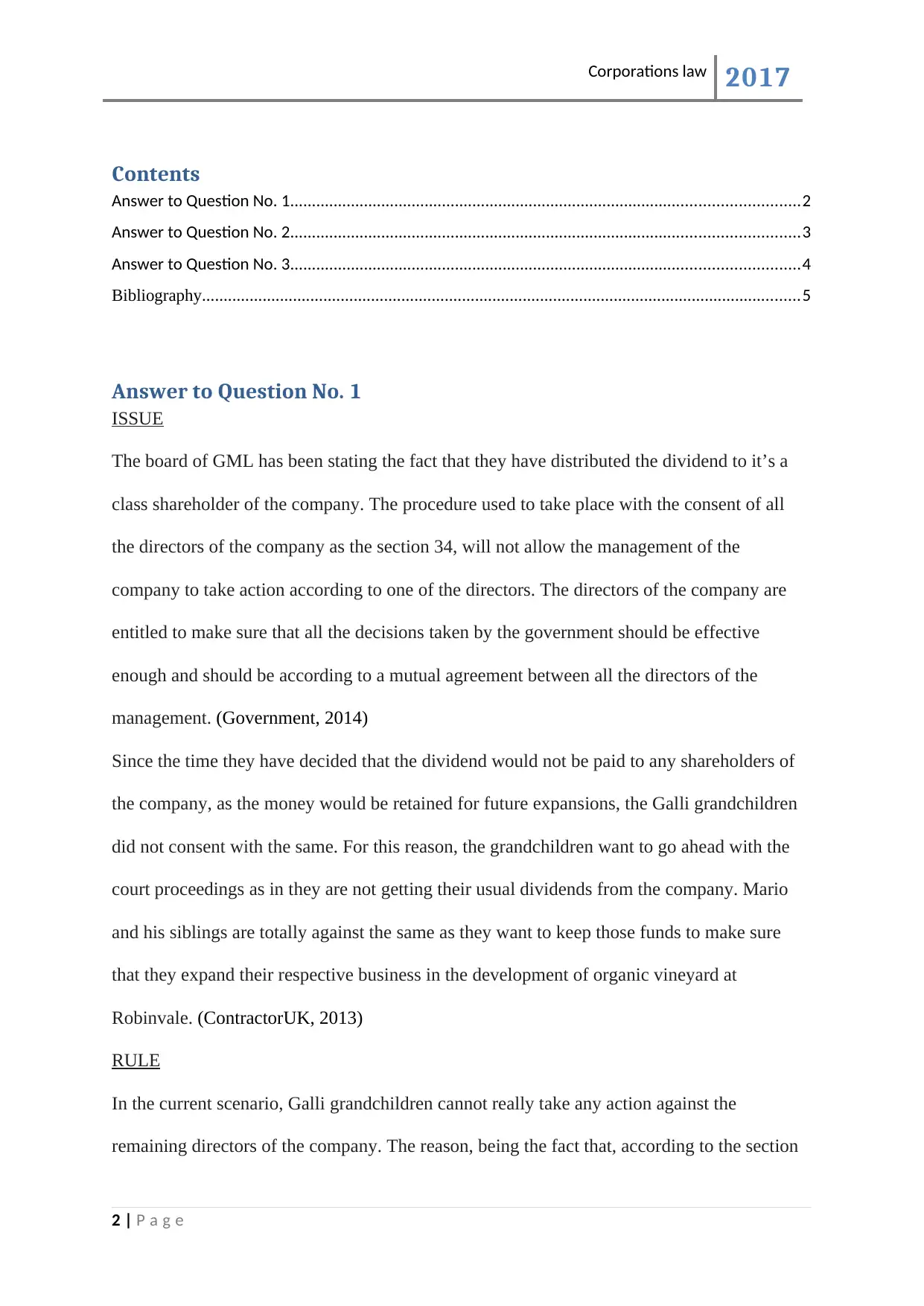
Corporations law 2017
Contents
Answer to Question No. 1.....................................................................................................................2
Answer to Question No. 2.....................................................................................................................3
Answer to Question No. 3.....................................................................................................................4
Bibliography..........................................................................................................................................5
Answer to Question No. 1
ISSUE
The board of GML has been stating the fact that they have distributed the dividend to it’s a
class shareholder of the company. The procedure used to take place with the consent of all
the directors of the company as the section 34, will not allow the management of the
company to take action according to one of the directors. The directors of the company are
entitled to make sure that all the decisions taken by the government should be effective
enough and should be according to a mutual agreement between all the directors of the
management. (Government, 2014)
Since the time they have decided that the dividend would not be paid to any shareholders of
the company, as the money would be retained for future expansions, the Galli grandchildren
did not consent with the same. For this reason, the grandchildren want to go ahead with the
court proceedings as in they are not getting their usual dividends from the company. Mario
and his siblings are totally against the same as they want to keep those funds to make sure
that they expand their respective business in the development of organic vineyard at
Robinvale. (ContractorUK, 2013)
RULE
In the current scenario, Galli grandchildren cannot really take any action against the
remaining directors of the company. The reason, being the fact that, according to the section
2 | P a g e
Contents
Answer to Question No. 1.....................................................................................................................2
Answer to Question No. 2.....................................................................................................................3
Answer to Question No. 3.....................................................................................................................4
Bibliography..........................................................................................................................................5
Answer to Question No. 1
ISSUE
The board of GML has been stating the fact that they have distributed the dividend to it’s a
class shareholder of the company. The procedure used to take place with the consent of all
the directors of the company as the section 34, will not allow the management of the
company to take action according to one of the directors. The directors of the company are
entitled to make sure that all the decisions taken by the government should be effective
enough and should be according to a mutual agreement between all the directors of the
management. (Government, 2014)
Since the time they have decided that the dividend would not be paid to any shareholders of
the company, as the money would be retained for future expansions, the Galli grandchildren
did not consent with the same. For this reason, the grandchildren want to go ahead with the
court proceedings as in they are not getting their usual dividends from the company. Mario
and his siblings are totally against the same as they want to keep those funds to make sure
that they expand their respective business in the development of organic vineyard at
Robinvale. (ContractorUK, 2013)
RULE
In the current scenario, Galli grandchildren cannot really take any action against the
remaining directors of the company. The reason, being the fact that, according to the section
2 | P a g e
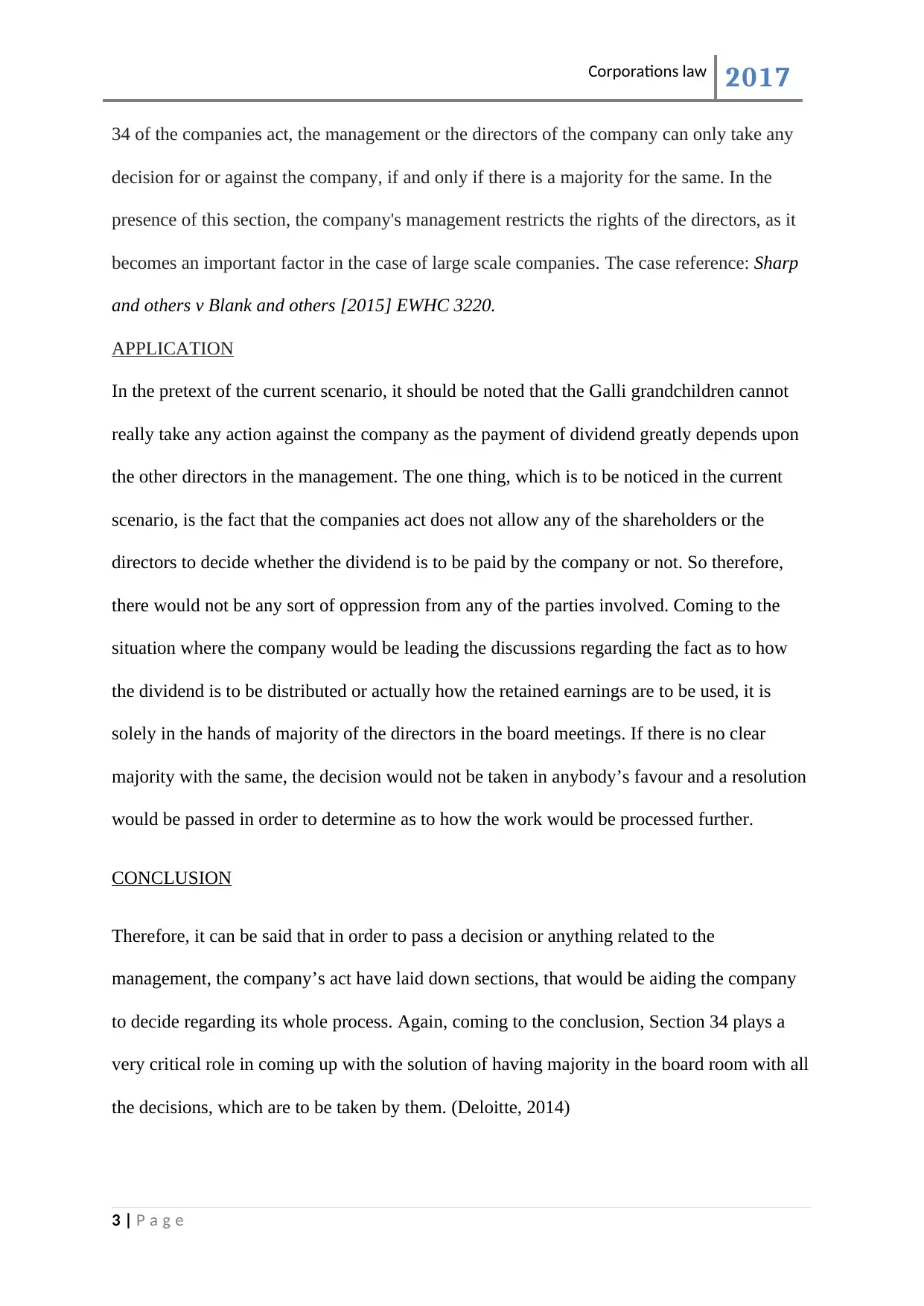
Corporations law 2017
34 of the companies act, the management or the directors of the company can only take any
decision for or against the company, if and only if there is a majority for the same. In the
presence of this section, the company's management restricts the rights of the directors, as it
becomes an important factor in the case of large scale companies. The case reference: Sharp
and others v Blank and others [2015] EWHC 3220.
APPLICATION
In the pretext of the current scenario, it should be noted that the Galli grandchildren cannot
really take any action against the company as the payment of dividend greatly depends upon
the other directors in the management. The one thing, which is to be noticed in the current
scenario, is the fact that the companies act does not allow any of the shareholders or the
directors to decide whether the dividend is to be paid by the company or not. So therefore,
there would not be any sort of oppression from any of the parties involved. Coming to the
situation where the company would be leading the discussions regarding the fact as to how
the dividend is to be distributed or actually how the retained earnings are to be used, it is
solely in the hands of majority of the directors in the board meetings. If there is no clear
majority with the same, the decision would not be taken in anybody’s favour and a resolution
would be passed in order to determine as to how the work would be processed further.
CONCLUSION
Therefore, it can be said that in order to pass a decision or anything related to the
management, the company’s act have laid down sections, that would be aiding the company
to decide regarding its whole process. Again, coming to the conclusion, Section 34 plays a
very critical role in coming up with the solution of having majority in the board room with all
the decisions, which are to be taken by them. (Deloitte, 2014)
3 | P a g e
34 of the companies act, the management or the directors of the company can only take any
decision for or against the company, if and only if there is a majority for the same. In the
presence of this section, the company's management restricts the rights of the directors, as it
becomes an important factor in the case of large scale companies. The case reference: Sharp
and others v Blank and others [2015] EWHC 3220.
APPLICATION
In the pretext of the current scenario, it should be noted that the Galli grandchildren cannot
really take any action against the company as the payment of dividend greatly depends upon
the other directors in the management. The one thing, which is to be noticed in the current
scenario, is the fact that the companies act does not allow any of the shareholders or the
directors to decide whether the dividend is to be paid by the company or not. So therefore,
there would not be any sort of oppression from any of the parties involved. Coming to the
situation where the company would be leading the discussions regarding the fact as to how
the dividend is to be distributed or actually how the retained earnings are to be used, it is
solely in the hands of majority of the directors in the board meetings. If there is no clear
majority with the same, the decision would not be taken in anybody’s favour and a resolution
would be passed in order to determine as to how the work would be processed further.
CONCLUSION
Therefore, it can be said that in order to pass a decision or anything related to the
management, the company’s act have laid down sections, that would be aiding the company
to decide regarding its whole process. Again, coming to the conclusion, Section 34 plays a
very critical role in coming up with the solution of having majority in the board room with all
the decisions, which are to be taken by them. (Deloitte, 2014)
3 | P a g e
⊘ This is a preview!⊘
Do you want full access?
Subscribe today to unlock all pages.

Trusted by 1+ million students worldwide
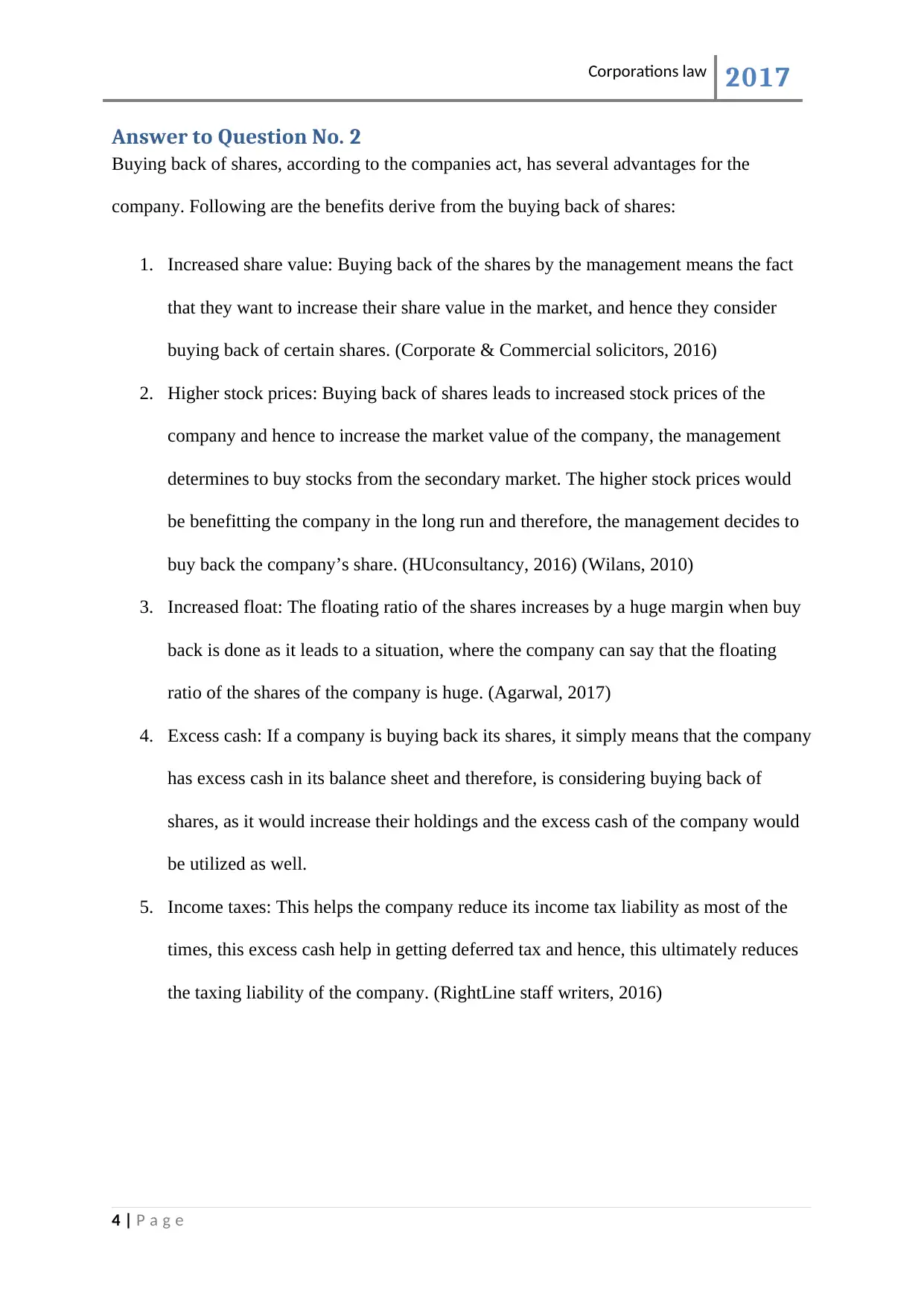
Corporations law 2017
Answer to Question No. 2
Buying back of shares, according to the companies act, has several advantages for the
company. Following are the benefits derive from the buying back of shares:
1. Increased share value: Buying back of the shares by the management means the fact
that they want to increase their share value in the market, and hence they consider
buying back of certain shares. (Corporate & Commercial solicitors, 2016)
2. Higher stock prices: Buying back of shares leads to increased stock prices of the
company and hence to increase the market value of the company, the management
determines to buy stocks from the secondary market. The higher stock prices would
be benefitting the company in the long run and therefore, the management decides to
buy back the company’s share. (HUconsultancy, 2016) (Wilans, 2010)
3. Increased float: The floating ratio of the shares increases by a huge margin when buy
back is done as it leads to a situation, where the company can say that the floating
ratio of the shares of the company is huge. (Agarwal, 2017)
4. Excess cash: If a company is buying back its shares, it simply means that the company
has excess cash in its balance sheet and therefore, is considering buying back of
shares, as it would increase their holdings and the excess cash of the company would
be utilized as well.
5. Income taxes: This helps the company reduce its income tax liability as most of the
times, this excess cash help in getting deferred tax and hence, this ultimately reduces
the taxing liability of the company. (RightLine staff writers, 2016)
4 | P a g e
Answer to Question No. 2
Buying back of shares, according to the companies act, has several advantages for the
company. Following are the benefits derive from the buying back of shares:
1. Increased share value: Buying back of the shares by the management means the fact
that they want to increase their share value in the market, and hence they consider
buying back of certain shares. (Corporate & Commercial solicitors, 2016)
2. Higher stock prices: Buying back of shares leads to increased stock prices of the
company and hence to increase the market value of the company, the management
determines to buy stocks from the secondary market. The higher stock prices would
be benefitting the company in the long run and therefore, the management decides to
buy back the company’s share. (HUconsultancy, 2016) (Wilans, 2010)
3. Increased float: The floating ratio of the shares increases by a huge margin when buy
back is done as it leads to a situation, where the company can say that the floating
ratio of the shares of the company is huge. (Agarwal, 2017)
4. Excess cash: If a company is buying back its shares, it simply means that the company
has excess cash in its balance sheet and therefore, is considering buying back of
shares, as it would increase their holdings and the excess cash of the company would
be utilized as well.
5. Income taxes: This helps the company reduce its income tax liability as most of the
times, this excess cash help in getting deferred tax and hence, this ultimately reduces
the taxing liability of the company. (RightLine staff writers, 2016)
4 | P a g e
Paraphrase This Document
Need a fresh take? Get an instant paraphrase of this document with our AI Paraphraser
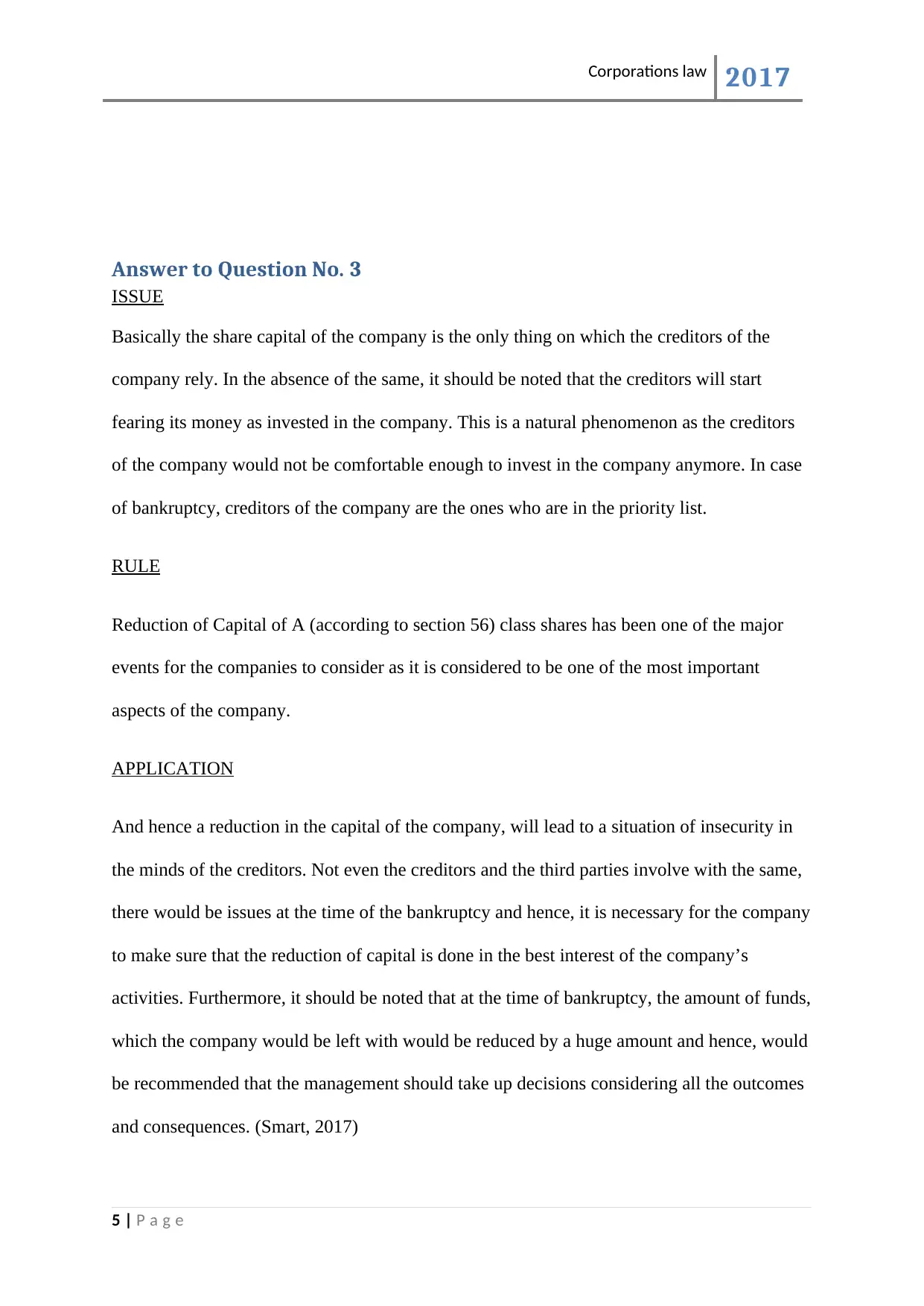
Corporations law 2017
Answer to Question No. 3
ISSUE
Basically the share capital of the company is the only thing on which the creditors of the
company rely. In the absence of the same, it should be noted that the creditors will start
fearing its money as invested in the company. This is a natural phenomenon as the creditors
of the company would not be comfortable enough to invest in the company anymore. In case
of bankruptcy, creditors of the company are the ones who are in the priority list.
RULE
Reduction of Capital of A (according to section 56) class shares has been one of the major
events for the companies to consider as it is considered to be one of the most important
aspects of the company.
APPLICATION
And hence a reduction in the capital of the company, will lead to a situation of insecurity in
the minds of the creditors. Not even the creditors and the third parties involve with the same,
there would be issues at the time of the bankruptcy and hence, it is necessary for the company
to make sure that the reduction of capital is done in the best interest of the company’s
activities. Furthermore, it should be noted that at the time of bankruptcy, the amount of funds,
which the company would be left with would be reduced by a huge amount and hence, would
be recommended that the management should take up decisions considering all the outcomes
and consequences. (Smart, 2017)
5 | P a g e
Answer to Question No. 3
ISSUE
Basically the share capital of the company is the only thing on which the creditors of the
company rely. In the absence of the same, it should be noted that the creditors will start
fearing its money as invested in the company. This is a natural phenomenon as the creditors
of the company would not be comfortable enough to invest in the company anymore. In case
of bankruptcy, creditors of the company are the ones who are in the priority list.
RULE
Reduction of Capital of A (according to section 56) class shares has been one of the major
events for the companies to consider as it is considered to be one of the most important
aspects of the company.
APPLICATION
And hence a reduction in the capital of the company, will lead to a situation of insecurity in
the minds of the creditors. Not even the creditors and the third parties involve with the same,
there would be issues at the time of the bankruptcy and hence, it is necessary for the company
to make sure that the reduction of capital is done in the best interest of the company’s
activities. Furthermore, it should be noted that at the time of bankruptcy, the amount of funds,
which the company would be left with would be reduced by a huge amount and hence, would
be recommended that the management should take up decisions considering all the outcomes
and consequences. (Smart, 2017)
5 | P a g e
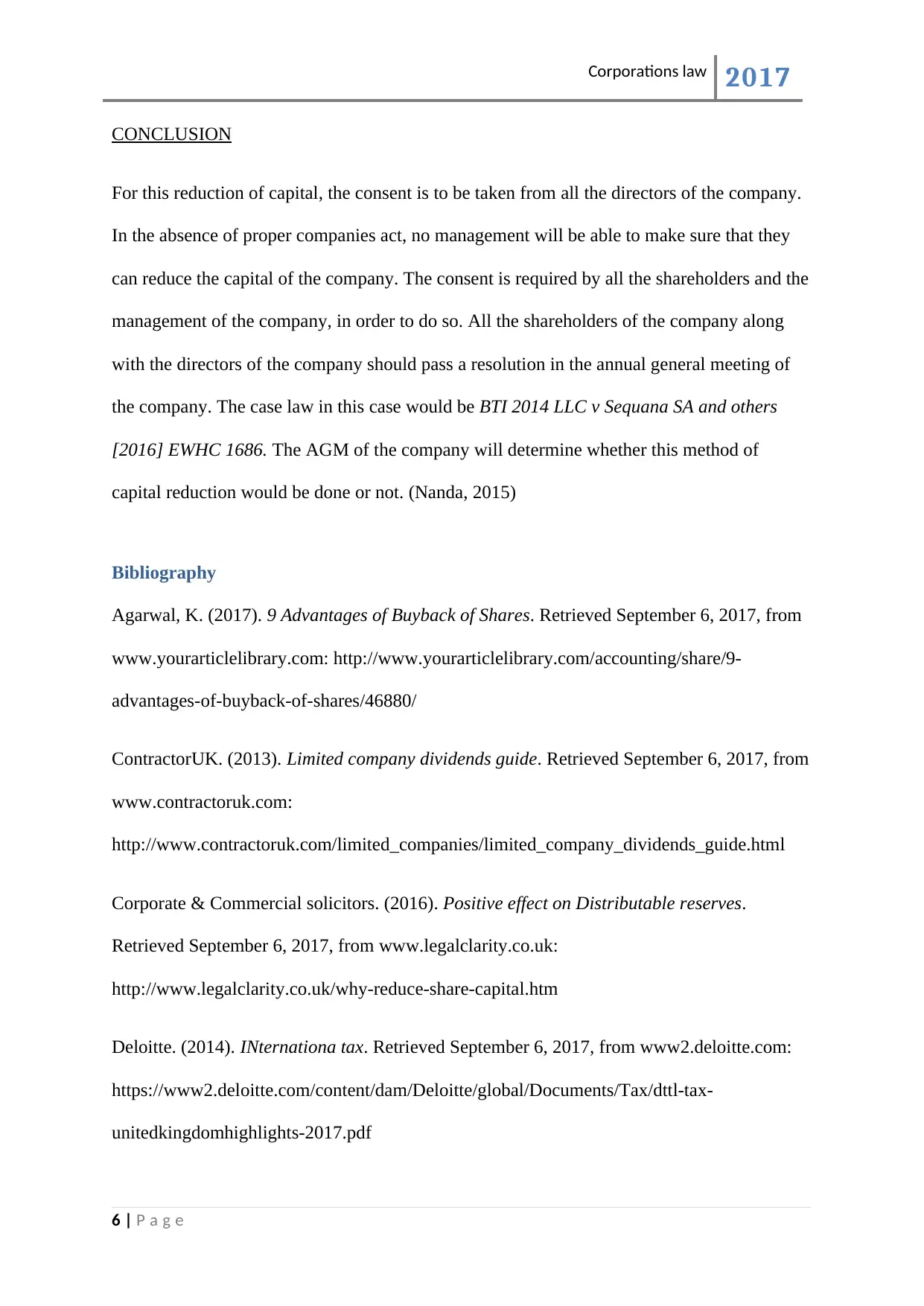
Corporations law 2017
CONCLUSION
For this reduction of capital, the consent is to be taken from all the directors of the company.
In the absence of proper companies act, no management will be able to make sure that they
can reduce the capital of the company. The consent is required by all the shareholders and the
management of the company, in order to do so. All the shareholders of the company along
with the directors of the company should pass a resolution in the annual general meeting of
the company. The case law in this case would be BTI 2014 LLC v Sequana SA and others
[2016] EWHC 1686. The AGM of the company will determine whether this method of
capital reduction would be done or not. (Nanda, 2015)
Bibliography
Agarwal, K. (2017). 9 Advantages of Buyback of Shares. Retrieved September 6, 2017, from
www.yourarticlelibrary.com: http://www.yourarticlelibrary.com/accounting/share/9-
advantages-of-buyback-of-shares/46880/
ContractorUK. (2013). Limited company dividends guide. Retrieved September 6, 2017, from
www.contractoruk.com:
http://www.contractoruk.com/limited_companies/limited_company_dividends_guide.html
Corporate & Commercial solicitors. (2016). Positive effect on Distributable reserves.
Retrieved September 6, 2017, from www.legalclarity.co.uk:
http://www.legalclarity.co.uk/why-reduce-share-capital.htm
Deloitte. (2014). INternationa tax. Retrieved September 6, 2017, from www2.deloitte.com:
https://www2.deloitte.com/content/dam/Deloitte/global/Documents/Tax/dttl-tax-
unitedkingdomhighlights-2017.pdf
6 | P a g e
CONCLUSION
For this reduction of capital, the consent is to be taken from all the directors of the company.
In the absence of proper companies act, no management will be able to make sure that they
can reduce the capital of the company. The consent is required by all the shareholders and the
management of the company, in order to do so. All the shareholders of the company along
with the directors of the company should pass a resolution in the annual general meeting of
the company. The case law in this case would be BTI 2014 LLC v Sequana SA and others
[2016] EWHC 1686. The AGM of the company will determine whether this method of
capital reduction would be done or not. (Nanda, 2015)
Bibliography
Agarwal, K. (2017). 9 Advantages of Buyback of Shares. Retrieved September 6, 2017, from
www.yourarticlelibrary.com: http://www.yourarticlelibrary.com/accounting/share/9-
advantages-of-buyback-of-shares/46880/
ContractorUK. (2013). Limited company dividends guide. Retrieved September 6, 2017, from
www.contractoruk.com:
http://www.contractoruk.com/limited_companies/limited_company_dividends_guide.html
Corporate & Commercial solicitors. (2016). Positive effect on Distributable reserves.
Retrieved September 6, 2017, from www.legalclarity.co.uk:
http://www.legalclarity.co.uk/why-reduce-share-capital.htm
Deloitte. (2014). INternationa tax. Retrieved September 6, 2017, from www2.deloitte.com:
https://www2.deloitte.com/content/dam/Deloitte/global/Documents/Tax/dttl-tax-
unitedkingdomhighlights-2017.pdf
6 | P a g e
⊘ This is a preview!⊘
Do you want full access?
Subscribe today to unlock all pages.

Trusted by 1+ million students worldwide
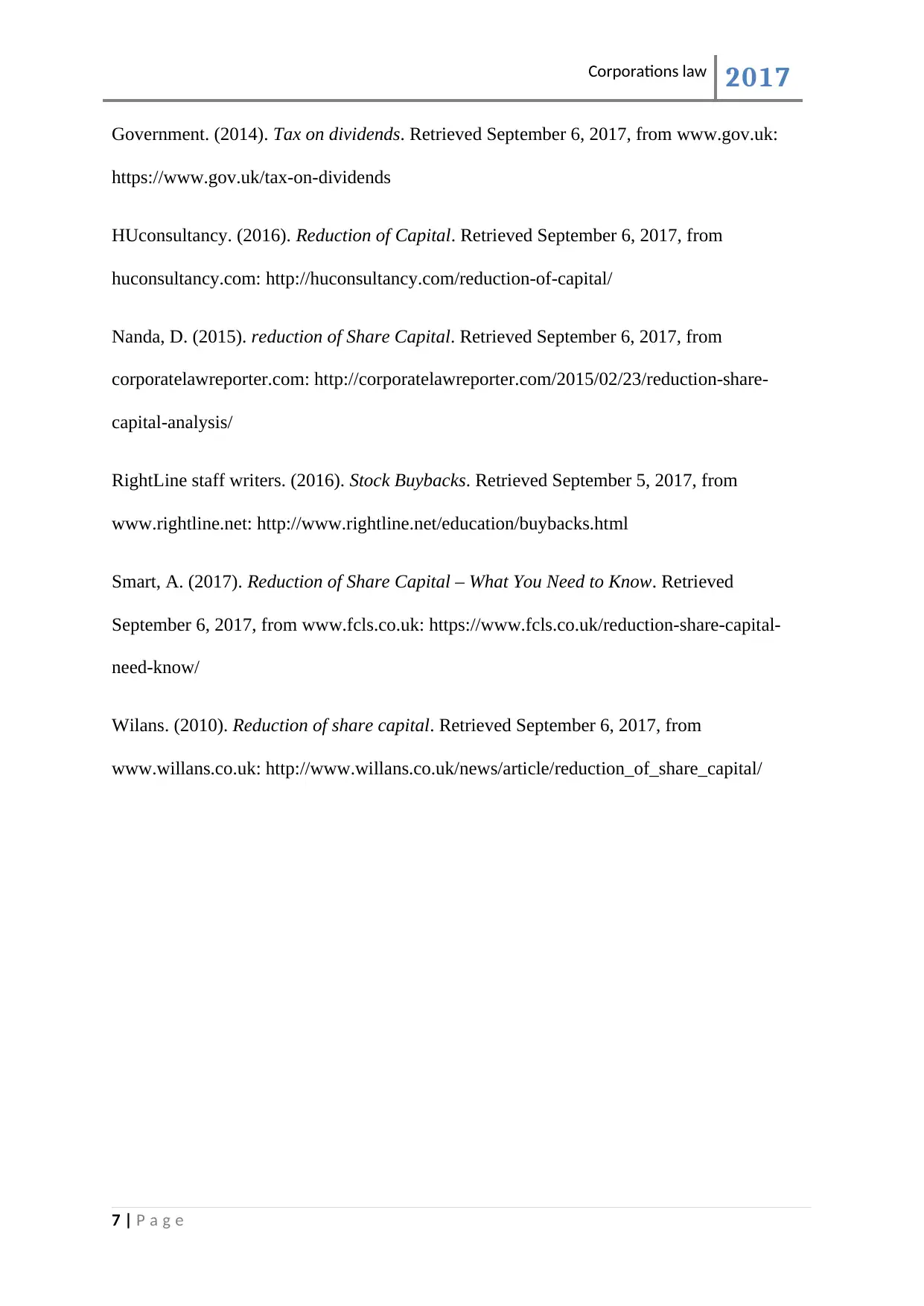
Corporations law 2017
Government. (2014). Tax on dividends. Retrieved September 6, 2017, from www.gov.uk:
https://www.gov.uk/tax-on-dividends
HUconsultancy. (2016). Reduction of Capital. Retrieved September 6, 2017, from
huconsultancy.com: http://huconsultancy.com/reduction-of-capital/
Nanda, D. (2015). reduction of Share Capital. Retrieved September 6, 2017, from
corporatelawreporter.com: http://corporatelawreporter.com/2015/02/23/reduction-share-
capital-analysis/
RightLine staff writers. (2016). Stock Buybacks. Retrieved September 5, 2017, from
www.rightline.net: http://www.rightline.net/education/buybacks.html
Smart, A. (2017). Reduction of Share Capital – What You Need to Know. Retrieved
September 6, 2017, from www.fcls.co.uk: https://www.fcls.co.uk/reduction-share-capital-
need-know/
Wilans. (2010). Reduction of share capital. Retrieved September 6, 2017, from
www.willans.co.uk: http://www.willans.co.uk/news/article/reduction_of_share_capital/
7 | P a g e
Government. (2014). Tax on dividends. Retrieved September 6, 2017, from www.gov.uk:
https://www.gov.uk/tax-on-dividends
HUconsultancy. (2016). Reduction of Capital. Retrieved September 6, 2017, from
huconsultancy.com: http://huconsultancy.com/reduction-of-capital/
Nanda, D. (2015). reduction of Share Capital. Retrieved September 6, 2017, from
corporatelawreporter.com: http://corporatelawreporter.com/2015/02/23/reduction-share-
capital-analysis/
RightLine staff writers. (2016). Stock Buybacks. Retrieved September 5, 2017, from
www.rightline.net: http://www.rightline.net/education/buybacks.html
Smart, A. (2017). Reduction of Share Capital – What You Need to Know. Retrieved
September 6, 2017, from www.fcls.co.uk: https://www.fcls.co.uk/reduction-share-capital-
need-know/
Wilans. (2010). Reduction of share capital. Retrieved September 6, 2017, from
www.willans.co.uk: http://www.willans.co.uk/news/article/reduction_of_share_capital/
7 | P a g e
1 out of 7
Related Documents
Your All-in-One AI-Powered Toolkit for Academic Success.
+13062052269
info@desklib.com
Available 24*7 on WhatsApp / Email
![[object Object]](/_next/static/media/star-bottom.7253800d.svg)
Unlock your academic potential
Copyright © 2020–2025 A2Z Services. All Rights Reserved. Developed and managed by ZUCOL.





